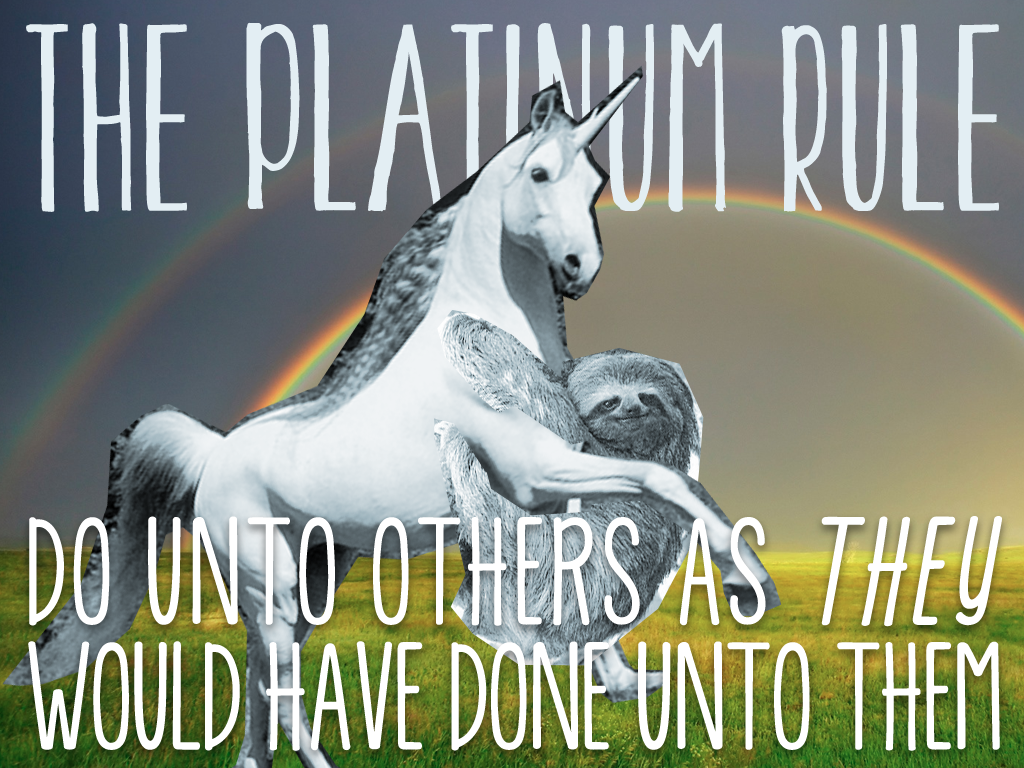Do unto others as you would have them do unto you. Right?
Wrong.
What we’ve been teaching our children, what I have learned and re-learned all of my life, is one of the worst pieces of advice around. What’s worse: it’s nearly universally accepted as gospel (pun intended).
Before I tell you what’s wrong with it (and there’s plenty), let’s figure out where it comes from. Let’s point some fingers, shall we?
To Wikipedia!
Wikipedia, without a doubt one of the most amazing things invented by our generation (right between cell phone cameras and Neil Patrick Harris), puts it so:
The Golden Rule is arguably the most essential basis for the modern concept of human rights, in which each individual has a right to just treatment, and a reciprocal responsibility to ensure justice for others. A key element of the Golden Rule is that a person attempting to live by this rule treats all people with consideration, not just members of his or her in-group. The Golden Rule has its roots in a wide range of world cultures, and is a standard which different cultures use to resolve conflicts.
Then our mentally well-endowed friends go on to contribute that the Golden Rule is about as universal as breathing. Buddhists, Christians, Confucianists, Hindus, Jews, Jains, and so many more have iterations of the rule in their philosophy. You can trace it back thousands of years to ancient Babylon, which, apparently, was more than just a pretty garden.
The point is this: the Golden Rule is widespread. The point is this: the Golden Rule is as dangerous as it is widespread. The point is this: keep reading.
What’s the problem with the Golden Rule?
I was playing soccer and I overheard a spat. It had nothing to do with soccer (a drama free sport), but we were on the field. “I’m pissed that you made that comment on the picture [on Facebook],” he snapped. ”I didn’t realize it’d make you mad,” she replied, “That kind of thing never upsets me. It was a joke. Why are you so sensitive?”
The Golden Rule’s corruption doesn’t even respect the sacred boundaries of a soccer pitch.
You didn’t catch it? Let’s review the play-by-play.
“I didn’t realize it’d make you mad.”
We often base our assumptions off of hypothesizing how someone else might feel/react/etc. in a certain situation. And we all know the danger with assuming and that silly expression I never get right (it does something to our asses?). Some might say it’s human nature. It’s in our DNA. I don’t think that’s necessarily the case. But we can all agree, whatever the root, assumptions can be dangerous.
“That kind of thing never upsets me.”
Another way we fuel our assumptions is by “putting ourselves in others’ shoes” and guestimating (a word I learned in 5th grade that means “to make up”) how they would react. Try as you might, you can’t put yourself in another’s shoes. This statement is the essence of what’s wrong with the Golden Rule, so I’ll say it again: you can’t put yourself in another’s shoes. ”I didn’t do unto you as I would not have you do unto me, dude.” The “dude” freshens it up a bit. The “unto”s are stale.
“It was a joke. Why are you so sensitive?”
Ouch, salt in the wound. What she was really saying is, “Dude (fresh, right?), I did unto you exactly how I would have you do unto me, yet you are still upset, so clearly there is something wrong with you. What I did was completely justified and reinforced by thousands of iterations of the Golden Rule that have been socialized unto my head recursively since birth, dude.”
The Corruption of the Golden Rule
The Golden Rule, despite being based upon what I would assume (oops!) were good intentions, is fundamentally flawed. It requires us to assume what will make people happy/comfortable/not snappy, then act upon those assumptions in an effort of goodness. Worse, we have been taught and retaught the Golden Rule so many times that we internally justify this behavior as invincible, despite the fact that it fails constantly.
Ever worked with a “difficult person”? I would bet (not much money, I’m poor) that those “difficulties” you faced were exacerbated by your [probably] inadvertent exercising of the Golden Rule. Do unto a difficult (=different from you) person as you would have done unto you (=same as you), and you’re going to be done unto with a headache and a screaming sound inside of your head.
So what? Am I just going to tear apart your social foundation of goodness and leave you starving for a way to make those around you happy? Never. I’ll feed you, baby birds (thanks, Tosh).
Introducing: The Platinum Rule
Platinum is worth about three times as much as gold (per ounce, market value). That’s important for the name. Keep that in mind. The platinum rule is so simple that I’m going to write it twice. “Do unto others as they would have done unto them, dudes.”
Do unto others as they would have done unto them, dudes.
(I added the “dudes” to freshen up the unto, but the platinum rule itself was coined by Milton Bennett in the 70s.)
There is a common response to the presentation of the platinum rule: “How do I figure out how other people want to be treated?” I’m always asked in a sassy, know-it-all kind of tone. “Ask them,” I reply, in an equally sassy tone.
It’s that simple.
A big exception: above the Platinum Rule comes the “do no harm” rule, which, as its name suggests, means that before you do unto someone, make sure you’re not doing harm unto someone. This exception protects the Platinum Rule against two of the most popular rebuttals, which I’ve named the “Kevorkian Dilemma” (you don’t have to hurt people even if they ask you to hurt them) and the “Veruca Salt Argument” (candy is not a meal, and spoiling people can be harmful and lead to cavities).
What do you think of the Platinum Rule? You can reply back to me here, share it with a friend on social media and see what they think, or let me know what you think on Facebook or Twitter.



